Dry and dull skin is a common problem facing adults especially in the age group from mid-20’s and early 30’s. The reason behind this is because the body’s natural percentage of Hyaluronic acid responsible for retaining moisture in the skin decreases as you age, which can lead to the appearance of wrinkles, fine lines, and drier skin. This guide will help you get started on how hyaluronic acid works on the face. To bestow an intensely hydrated, youthful & plump skin.
What is Hyaluronic acid?
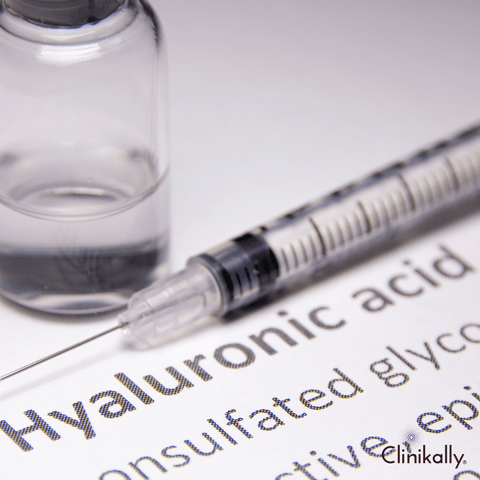
Hyaluronic acid or hyaluronan is a naturally occurring molecule that has properties of keeping the skin replenished and moisturized. The skin contains half of the Hyaluronic acid produced in the body, however as you age this key molecule, responsible for binding and retaining water molecules, gradually decreases due to internal factors like ageing and prolonged exposure to UV radiation leading to loss of moisture, appearance of fine lines and dryness. Understanding the ability of hyaluronic acid to modulate skin moisture can help prevent this common problem all of us face like wrinkles and dry skin.
Benefits of Hyaluronic acid serum for face
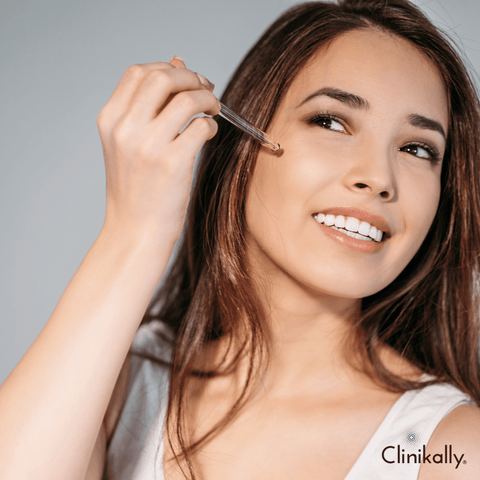
Many don’t know that when applied topically Hyaluronic acid is a humectant which means it is capable of binding 1000 times its weight in water. This gives your skin a youthful and plumping effect. Here are top five benefits of applying a dermatologist-recommended Hyaluronic acid serum topically on skin for a glowing, soft, and intensely moisturized skin.
#1 Keeps your skin hydrated
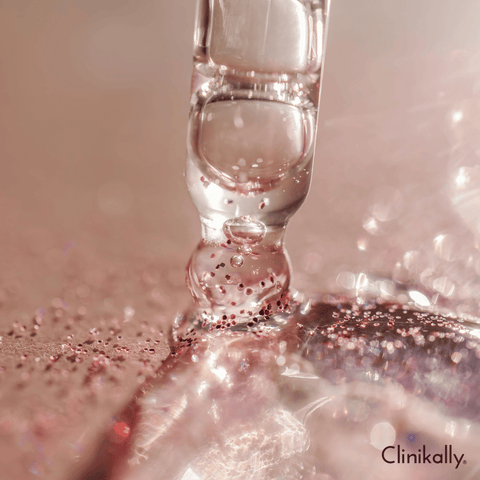
Hyaluronic Acid acts as a sponge and can retain up to 1000 times its molecular weight in water. This helps the skin to attract and retain moisture from air and from the moisturizers you apply thereby keeping the skin feel younger and fresh. Hyaluronic acid is well-known for its exceptional ability to keep the skin hydrated. Here's how it works and why it is beneficial:
-
Deep Hydration: When applied topically, hyaluronic acid penetrates the skin's layers, providing deep hydration that can help alleviate dryness and roughness.
-
Improved Skin Elasticity: Hydrated skin appears more elastic and firm, which helps to reduce the appearance of fine lines and wrinkles.
-
Soothing and calming properties: Hyaluronic acid has soothing properties, making it ideal for sensitive or irritated skin.
Tips for Improving Hydration:
- Apply to Damp Skin: Applying hyaluronic acid to slightly damp skin can aid in moisture retention.
- Moisturiser: After applying hyaluronic acid, apply a moisturiser to seal in the hydration and prevent moisture loss.
- Consistency is Key: Regular use of hyaluronic acid products in your skincare routine keeps your skin hydrated.
#2 Improves skin elasticity
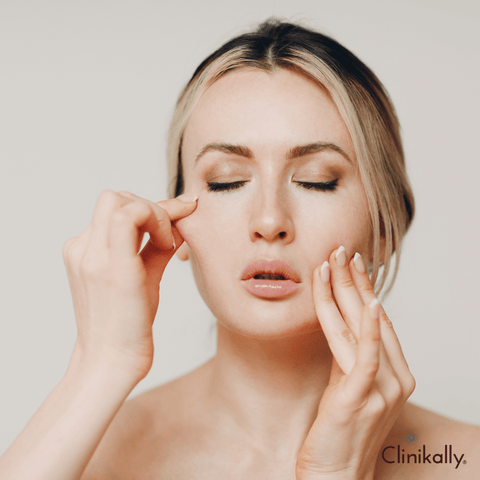
Who likes saggy skin? As we age the skin loses its elastin and collagen. Which keeps the skin firm and snappy. Topically applying Hyaluronic acid serum has anti-aging property and helps smoothen the skin, as it fills the skin with moisture giving it an overall tighter appearance. Here's how it works and what it does for skin elasticity:
Using Hyaluronic Acid to Improve Elasticity:
-
Topical Application: Hyaluronic acid can be found in a variety of skincare products such as serums, creams, and masks. Consistent application can aid in the maintenance and improvement of skin elasticity.
-
Combined with Other Ingredients: Combining hyaluronic acid with other beneficial ingredients, such as peptides or antioxidants, can increase its effectiveness in promoting skin elasticity.
Tips for Enhancing Elasticity:
-
Consistent Use: Using hyaluronic acid products as part of your skincare routine on a regular basis promotes long-term improvements in skin elasticity.
-
Sun Protection: Using sunscreen to protect your skin from UV damage helps to prevent collagen breakdown, which supports overall skin elasticity.
-
Healthy Lifestyle: You can promote skin elasticity by eating a diet rich in antioxidants, drinking plenty of water, avoiding smoking, and exposing your skin to too much sun.
#3 Helps to protect against environmental stressors

Pure Hyaluronic Acid Serum defends your skin against from environmental stressors like prolonged exposure to UV rays, environmental pollution, and lifestyle choices like smoking which causes more fine lines, wrinkles, dark spots, and drier skin. By helping retain moisture, Hyaluronic Acid serum overtime helps slow down the deterioration of lipid barrier which prevents irritants entering the skin and helps fight harmful toxins, which the skin is exposed daily. How it can protect the skin is as follows:
-
Moisture Barrier Support: Hyaluronic acid keeps the skin moisturised, which can help build the skin's natural barrier against environmental stresses such as pollution, dry air, and harsh weather conditions.
-
Effects as an Antioxidant and Anti-Inflammatory: According to some research, hyaluronic acid may possess antioxidant properties that help combat oxidative stress brought on by environmental pollutants and UV radiation. It might have mild anti-inflammatory qualities that help relieve skin irritation brought on by aggressors in the environment.
-
Skin Protection: Hyaluronic acid forms a protective barrier on the skin by keeping it suitably moisturised, limiting the penetration of external contaminants and irritants.
-
Complementary Benefits: Hyaluronic acid frequently works well in conjunction with other protective and calming compounds like antioxidants (e.g., vitamin C, vitamin E) and peptides, providing further defence against environmental stresses.
Limitations and Considerations:
-
Not a Direct Shield: While hyaluronic acid can help the skin's defence mechanisms indirectly, it is important to note that it is not a replacement for dedicated sunscreens or specialised treatments intended specifically for environmental protection.
-
Sun Protection: Using sunscreen on a daily basis is essential for protecting the skin from harmful UV rays, which are one of the most major environmental stressors impacting the skin.
#4 Offers restorative and skin-rejuvenating properties

By offering extra hydration and moisture retention, topical hyaluronic acid serum helps promote skin cell regeneration. This gives a vibrant complexion to the skin. The serum helps to keep the skin hydrated and also promotes heightened skin cells production which makes the skin look smoother and fresh. This also helps reduce the fine lines and wrinkles. How it can help the skin is as follows:
-
Hydration and plumping: Hyaluronic acid deeply hydrates the skin due to its extraordinary ability to retain moisture. This moisture plumps up the skin, making wrinkles and fine lines less noticeable.
-
Improved Skin Texture: Hyaluronic acid can improve skin elasticity by keeping the skin hydrated, making the skin appear firmer and more supple.
-
Collagen Stimulation: According to some research, hyaluronic acid may stimulate collagen synthesis, which is a vital protein that provides structural support to the skin. Increased collagen can help with skin rejuvenation and a younger appearance.
-
Skin Barrier Support: Hyaluronic acid helps to protect the skin's natural barrier by retaining moisture, which is essential for skin rejuvenation.
-
Anti-Aging Benefits: Improved hydration and collagen stimulation can help reduce the appearance of wrinkles and fine lines, contributing to a more youthful complexion.
-
Post-Inflammatory Healing: Hyaluronic acid has mild anti-inflammatory properties, which may aid in the healing of skin irritations and promote a more youthful appearance.
#5 Works well with all skin types
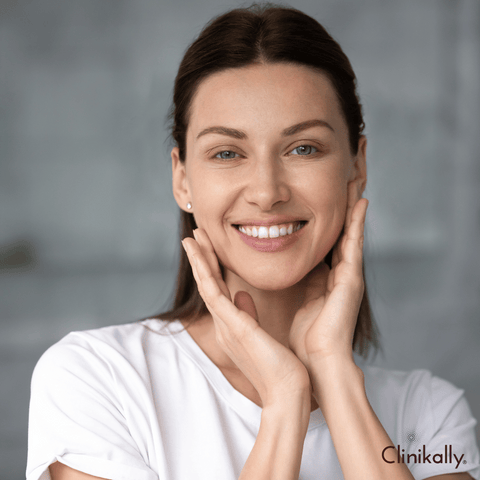
Hyaluronic acid is one skincare ingredient that works well with any skin type. It helps keeping the skin hydrated no matter if your skin type is oily, sensitive, or prone to breakout. So, whether you are trying to fight that persistent acne or just trying to achieve more supple and plump-looking skin, a dermatologist-recommended Hyaluronic acid serum for face can go a long way to help!
#6 Boosts skin's natural radiance

Maintaining skin's natural radiance involves a variety of factors, and post-exercise practises can help to improve skin's glow:
-
Improved Blood Circulation: Physical activity improves blood circulation, delivering oxygen and nutrients to skin cells and contributing to a post-exercise glow or radiance.
-
Sweating and Detoxification: Sweating aids in the clearing of pores by flushing out toxins and impurities, giving the skin a more youthful appearance.
-
Stress Reduction: Exercise can help reduce stress, and lower stress is often associated with better skin conditions and a more radiant complexion.
-
Hydration: Staying hydrated during and after exercise helps keep skin moisturised, which contributes to a healthy glow.
Considerations for Radiant Skin:
-
Post-Exercise Skincare: After showering, apply a gentle moisturiser suitable for your skin type to lock in moisture and maintain hydration.
-
Prevent Over-Cleansing: Although taking a shower after a workout is advised, it is best to use a mild cleanser because harsh products or excessive cleansing can strip the skin of its natural oils.
-
Sun Protection: Use sunscreen when working out outside to shield your skin from UV rays that can cause damage and reduce the radiance of your skin.
-
Healthy Diet: The glow of your skin can be enhanced by eating a balanced diet full of vitamins, antioxidants, and water as well as fresh fruits and vegetables.
-
Enough Sleep: Restful sleep promotes skin renewal and repair, which keeps the complexion looking its best.
-
Stress management: Including techniques that help lower stress, like yoga, meditation, or deep breathing exercises, can improve the general health of your skin.
Individual Skin Care:
Each person has different skin, so it is important to recognise what your skin needs and adjust your skincare regimen accordingly. Enhancing the skin's natural radiance can be achieved through a combination of healthy lifestyle practises, meticulous skincare regimen, and proper post-exercise hygiene.
#7 Reduces fine lines and wrinkles
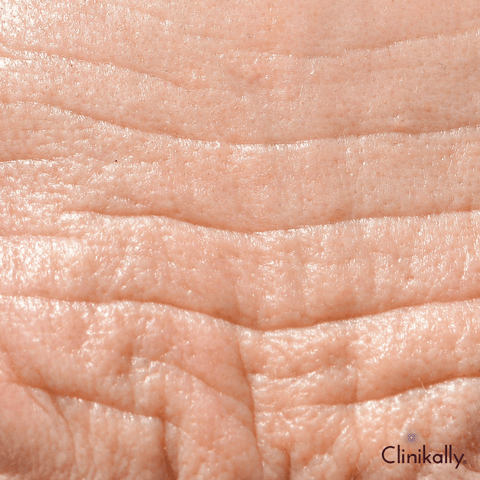
Through several mechanisms, exercise has the potential to help reduce the appearance of fine lines and wrinkles:
-
Improved Blood Circulation and Oxygenation: Exercise stimulates blood circulation, which allows oxygen and nutrients to reach the skin cells. This increased circulation can benefit skin health and potentially reduce the appearance of fine wrinkles.
-
Collagen Production: Physical activity on a regular basis may encourage the creation of collagen, a protein that provides structural support to the skin. Increased collagen levels can help fill the skin and hide fine lines and wrinkles.
-
Stress Reduction: Lowering stress levels through exercise may have secondary skin benefits. Because stress can hasten the ageing process of the skin, stress reduction may aid in the reduction of premature ageing indications.
-
Detoxification and Skin Health: Sweating during exercise aids in the removal of toxins from the body, which may contribute to clearer and healthier skin, as well as a reduction in fine lines.
-
Hydration: It is important for skin health to stay hydrated during exercise and throughout the day. Hydration may fill up the skin and make fine lines and wrinkles less visible.
Consistency and Complementary Practices:
-
Consistent Routine: Over time, a comprehensive skincare routine, a healthy lifestyle, and moderate exercise on a regular basis can help minimise the appearance of fine lines and wrinkles.
-
Sun Protection: Using sunscreen when engaging in outdoor activities helps ward off sun damage, which is a major cause of wrinkles and early ageing.
Individual Skin Care:
It should be noted that, while exercise can be beneficial to skin health, individual results may differ. Other factors, such as genetics, skincare routine, food, and sun protection, are also important in resolving fine lines and wrinkles. A dermatologist or skincare professional can provide personalised advise on skincare products, treatments, and lifestyle changes targeted to your skin type and issues, allowing you to effectively address fine lines and wrinkles.
< h2>How to use Hyaluronic Serum for face
After optimum cleansing of the skin, take a few drops of your Hyaluronic Serum onto the palm of your hand and apply carefully on the face and neck in upward circular motion until it gets absorbed into the skin. Hyaluronic acid must always, always be used on dampened skin. Applying it to dry skin, aggravates dryness by folds. You can apply it two times for best results in the morning and evening of your skincare regimen. When heading outside, apply a broad-spectrum sunscreen after its application.
Tips for applying serum for maximum effect
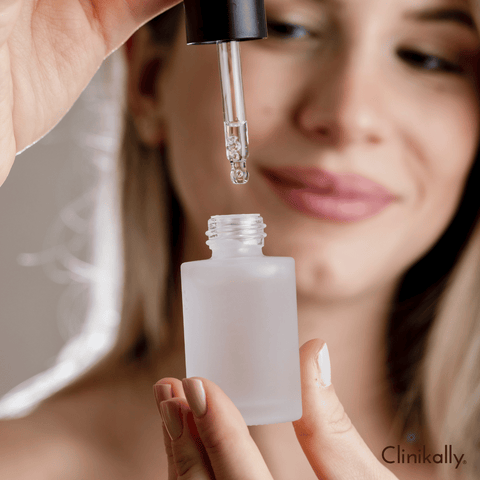
When applying serum for maximum effect, consider the following tips to optimise its benefits:
-
Cleanse and Tone: Let us start with a blank slate. To ensure that the serum is able to fully penetrate your skin, gently wash your face and then tone it afterwards to get rid of any leftover debris.
-
Apply on Damp Skin: Use a serum on skin that is just slightly damp. This may facilitate better absorption of the active ingredients in the serum and help seal in moisture.
-
Apply Gently Pressing Motions: Press or pat the serum onto the skin gently instead of rubbing it in. This process facilitates product absorption without needless rubbing or irritation.
-
Start with a Tiny Amount: Apply a tiny quantity of serum. Applying too much might not necessarily increase its effectiveness because a little goes a long way.
-
Concentrate on Problem Areas: Apply the serum primarily to areas that raise redness, uneven texture, or fine lines.
-
Follow with Moisturiser: To seal in the benefits of the serum and preserve hydration, use a suitable moisturiser after applying the serum.
-
Maintain Consistency: This is very important. Use the serum as part of your skincare routine on a regular basis to see noticeable results over time.
-
Consider Layering Products: If you are using multiple serums or skincare products, think about the order in which you apply them. Apply lighter-textured serums first to ensure better absorption.
-
Application Time: Depending on the product's recommendation and your skincare routine, apply the serum in the morning and/or evening.
-
Sun Protection: Always use sunscreen during the day to protect the skin from UV damage, especially if you are using serums that contain ingredients that can increase photosensitivity.
-
Adjust for Sensitivity: If you have sensitive skin, gradually introduce new serums and monitor how your skin reacts. If irritation occurs, discontinue use and seek professional advice.
-
Choose the Right Serum: To maximise its effectiveness, choose a serum that addresses your specific skincare concerns, such as hydration, anti-aging, brightening, or acne treatment.
Frequency of usage for best results
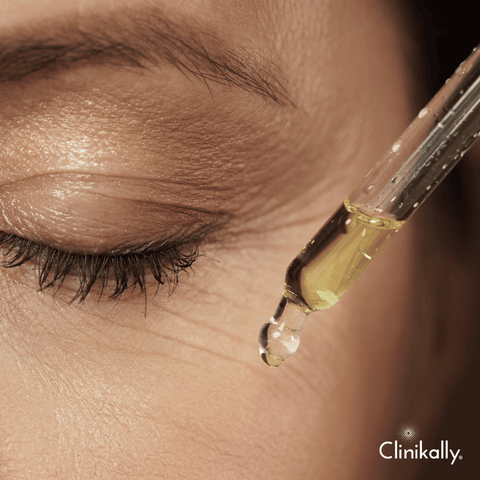
The frequency of serum usage can vary based on the specific serum, your skin type, and its ingredients. However, for most serums, a consistent and routine application is essential for optimal results. Here are some general guidelines:
-
Daily Use: It is recommended to apply serums twice a day, in the morning and evening, following cleansing and toning but prior to moisturising, as many of them are meant for daily use.
-
Consider Specific Recommendations: Product Instructions: Make sure you adhere to the directions supplied by the dermatologist or the serum's manufacturer. Some serums recommend daily application, while others recommend every other day or once a day.
-
Active Ingredients: Potency and Sensitivity: Serums containing potent active ingredients such as retinoids or alpha hydroxy acids (AHAs) may require less frequent application at first to allow the skin to adjust. Increase usage gradually according to tolerance.
-
Skin Sensitivity: If you have sensitive skin, begin with a lower frequency of use and gradually increase as your skin adapts. Monitor for any signs of irritation or redness.
-
Targeted Treatment: If using a serum for targeted treatment (e.g., anti-aging, acne), consistent use according to the product's directions can yield better results over time.
-
Consistency Matters: Consistency is key for seeing noticeable results. Establish a routine that suits your skin and stick to it.
-
Adjust Based on Results: Observe how your skin responds to the serum. If you notice positive changes without irritation, you can maintain the frequency or adjust as needed for better results.
Professional Advice: Consider seeing a dermatologist or skincare specialist for personalised advice on serum usage frequency based on your skin type, issues, and the exact serum you're using. They can advise you on the best application frequency for your skin in order to achieve the best effects while minimising the risk of irritation or bad reactions.
Finding the perfect Hyaluronic acid serum
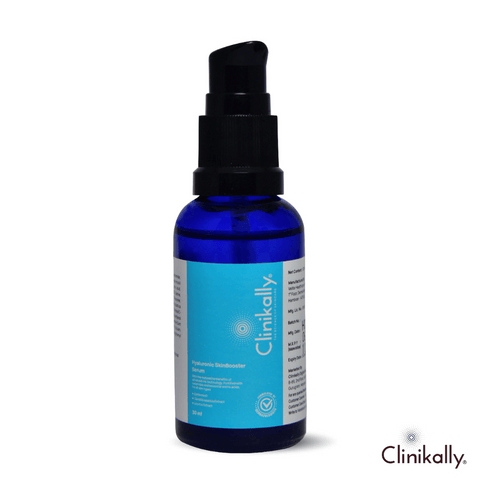
Every person’s skin type is different. So, what works for someone else might not work for you. For a perfectly balanced concentration of Hyaluronic acid serum that works best for your skin type, a personalized treatment plan is recommended. If you wish to ask for expert advice from a skin doctor, you can now consult dermatologists in India from home. Clinikally is a digital skin & hair care platform that allows you to connect with leading skin doctors no matter where you are. So, you can get personalized advice on how to use Hyaluronic Serum for skin benefits depending on your own skin type!
Side effects of Hyaluronic acid serum
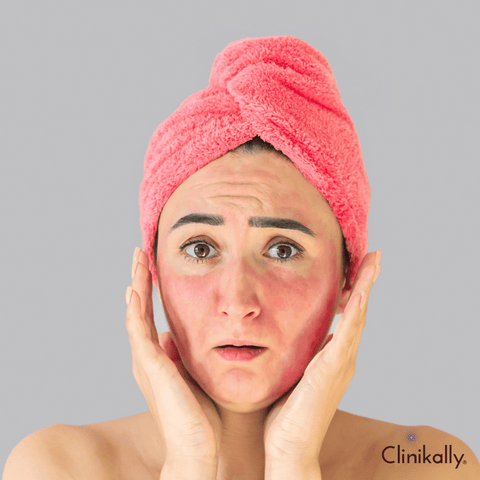
As our body naturally produces Hyaluronic acid, the serum is safe to use for intense hydration. Moreover, backed by science and recommended by leading dermatologists across India, it is effective in treating skin dryness and dullness without bearing any side effects. However, caution should be taken when applying it near mucous membranes like eyes and mouth. A patch test is recommended before use. The following are some of the possible side effects of hyaluronic acid serum:
-
Skin Irritation: Some people may experience mild irritation, redness, itching, or a stinging sensation after applying the product for the first time, especially if they have sensitive skin or are allergic to hyaluronic acid.
-
Breakouts: In rare cases, individuals may experience breakouts or increased acne as a result of excessive hydration or sensitivity to specific serum formulations or ingredients.
-
Allergic Reactions: Although uncommon, some people may be allergic to hyaluronic acid or other serum ingredients, resulting in allergic skin reactions such as hives, swelling, or rash.
The best way to avoid side effects of Hyaluronic acid is to use the right product as per your skin type and concerns. You can get an dermatologist consultation online to discover which Hyaluronic acid skincare products will be safe and effective for your skin type.
Hyaluronic acid serum for dry skin vs. oily skin
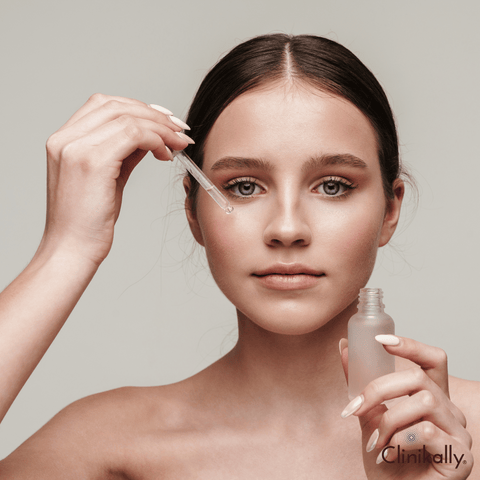
The serum is suitable for all skin types no matter your skin type including oily skin and does not cause purging or breakout. Since it fights skin dryness, Hyaluronic acid serums are often sought after by people with dry or cracked skin. However, it will work just as well for overall healthy skin for people with oily skin.
Recommendations for top Hyaluronic acid brands
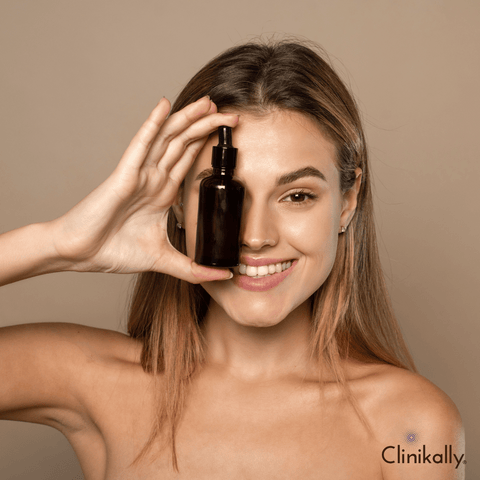
Several skincare brands offered quality hyaluronic acid serums or products known for their efficacy and formulation. Here are some reputable brands known for their hyaluronic acid products:
-
DERMATICA HA PURE Serum: Hydrate your skin across multiple layers and plump up the skin to make it firm with the DERMATICA HA PURE Serum for intense hydration and antioxidant protection. It is a skin serum containing an optimised mix of multi-molecular weight Hyaluronic acid. Its diversified nutrients, vitamins, and minerals improve cell communication leaving the skin fresh and well hydrated.
-
Clinikally Hyaluronic SkinBooster Serum: Transform your skin with the hydrating action and multi-nutrient nourishment of Clinikally Hyaluronic SkinBooster Serum, suitable for all skin types. It locks moisture into the skin by combining the power of ceramides with Hyaluronic acid, the body's natural moisturiser.
-
Peltos Hyaluronic Acid Sleep Mask: Rejuvenate your skin while you sleep for a plump and youthful look with the Peltos Hyaluronic Acid Sleep Mask with antioxidants and other skin-brightening agents. It works while you sleep by intensely hydrating the skin both immediately and in the long-term, making it suitable for dry or dehydrated skin. The Peltos Hyaluronic Acid sleeping mask also restores the skin barrier and transepidermal water loss to give you fresh-looking skin.
-
ISDIN Hyaluronic Concentrate Serum: ISDIN Hyaluronic Concentrate Serum is a game-changer for your skin. Packed with pure hyaluronic acid of varying molecular weights, its aqua-gel formula deeply hydrates, plumps, and erases the signs of aging like wrinkles and pores. Your skin will radiate with newfound luminosity, giving you a youthful, flawless glow. It's not just skincare; it's a secret to timeless beauty.
Consider your skin type, sensitivities, other active components in the formulation, and specific skincare goals before selecting a hyaluronic acid product or serum. Additionally, before adopting new skincare products, always perform a patch test to ensure they suit your skin and do not cause any unpleasant reactions. Please keep in mind that the availability and formulations of skincare products may have changed since my previous update, so before making a purchase, check for current reviews, ingredient lists, and compatibility for your skin type.









































